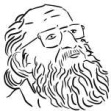Is there a place for Paulo Freire's theory in contemporary university pedagogy?
DOI:
https://doi.org/10.35699/2237-5864.2021.34884Keywords:
University pedagogy, Freire's theory, Teaching-learningAbstract
This article is the result of theoretical research, of qualitative nature, with the aim of answering the question: is there a place for Freire's theory in contemporary university pedagogy? In 2021, the birth centenary of the patron of Brazilian education is celebrated. Based on his works and others that deal with university pedagogy, we argue intending to build bridges between them. Some concepts that are diluted in Freire's theory will be discussed, as well as arguments will be built to demonstrate that there is still a lot to learn and understand about it. The choice for the concepts presented was not random: it was based on the academic experience of the authors and on the knowledge that they have about the thinker's work, believing that that represents important aspects of a teacher profile expected for acting in university teaching.
Downloads
References
ALMEIDA, Maria Isabel de. Formação do professor do ensino superior: desafios e políticas institucionais. São Paulo: Cortez, 2012.
ARROYO, Miguel. Currículo, territórios em disputa. Petrópolis: Vozes, 2011.
BAUMAN, Zygmunt. Modernidade líquida. São Paulo: Companhia das Letras, 2001.
BECK, Ulrich. Sociedade de risco: rumo a uma outra modernidade. São Paulo: Editora 34, 2011.
BOUFLEUER, José Pedro. O ser-fazer da docência: esboço de compreensão a partir da condição humana. In: MENDONÇA, Samuel; GALLO, Sílvio (org.). A escola: problema filosófico. São Paulo: Parábola, 2020, p. 15-28.
BRASIL. Lei nº 12.612, de 13 de abril de 2012. Declara o educador Paulo Freire Patrono da Educação Brasileira. Diário Oficial da União, Brasília, DF, 2012. Disponível em: http://www.planalto.gov.br/ccivil_03/_ato2011-2014/2012/lei/l12612.htm. Acesso em: jun. 2021.
CALVINO, Ítalo. Por que ler os clássicos? São Paulo: Companhia das Letras, 1993.
DALBOSCO, Cláudio. A filosofia, a escola e o experimento formativo: a libertas como cultivo da soberba inflamada. In: GALLO, Sílvio; MENDONÇA, Samuel (org.). A escola: uma questão pública. São Paulo: Parábola, 2020, p. 19-38.
DIÁLOGO/DIALOGICIDADE. In: STRECK, Danilo Romeu; RENDÍN, Euclides; ZITKOSKI, Jaime José (org.). Dicionário Paulo Freire. 2. ed. em português, rev. e ampl. Belo Horizonte: Autêntica Editora, 2008, p. 153-154.
DUBET, François. O tempo das paixões tristes. São Paulo: Vestígio, 2020.
FREIRE, Paulo. Educação e Mudança. Rio de Janeiro: Paz e Terra, 1979.
FREIRE, Paulo. Pedagogia do oprimido. Rio de Janeiro: Paz e Terra, 1983.
FREIRE, Paulo. Pedagogia da esperança: um reencontro com a Pedagogia do oprimido. Rio de Janeiro: Paz e Terra, 1992.
FREIRE, Paulo. Pedagogia da autonomia: saberes necessários à prática educativa. Rio de Janeiro: Paz e Terra, 1997.
FREIRE, Paulo. Pedagogia da tolerância. São Paulo: Unesp, 2004.
GOERGEN, Pedro. O sentido da educação na sociedade contemporânea. In: GALLO, Sílvio; MENDONÇA, Samuel (org.). A escola: uma questão pública. São Paulo: Parábola, 2020, p. 123-145.
JUNG, Hildegard Susana; VAZ, Douglas; BENATTI, Remi Maria Zanatta. As políticas públicas educacionais em tempos de educação 3.0: limites e possibilidades. Revista de Educação ANEC, Brasília, v. 47, n. 160, p. 32-45, out./dez. 2019. Disponível em: https://revistas.anec.org.br/index.php/revistaeducacao/article/view/236/161. Acesso em: 21 ago. 2021. DOI: https://doi.org/10.22560/reanec.v47i160.236.
MACIEL, Adriana Moreira da Rocha. O processo formativo do professor do ensino superior. In: ISAIA, Silvia Maria de Aguiar; BOLZAN, Dóris Pires Vargas; MACIEL, Adriana Moreira da Rocha. Pedagogia universitária: tecendo redes sobre a educação superior. Santa Maria: Editora UFSM, 2009.
MORIN, Edgar. Ensinar a viver: manifesto para mudar a educação. Porto Alegre: Sulina, 2015.
MORIN, Edgar. Reinventar a educação: abrir caminhos para a metamorfose da humanidade. São Paulo: Palas Athena, 2016.
MOROSINI, Marília et al. Enciclopédia de pedagogia universitária: glossário. v. 2. Brasília: INEP/MEC, 2006. Disponível em: http://portal.inep.gov.br/documents/186968/484184/Enciclop%C3%A9dia+de+pedagogia+universit%C3%A1ria+gloss%C3%A1rio+vol+2/b9d6f55d-1780-46ef-819a-cdc81ceeac39?version=1.0. Acesso em: 27 mar. 2021.
RODRIGUES, Paulo Henrique; ARANHA, Norberto. Sociedade 5.0: o Professor e a construção de uma nova sociedade centrada no humano. In: SIMPÓSIO DOS PROGRAMAS DE MESTRADO PROFISSIONAL UNIDADE DE PÓS-GRADUAÇÃO, EXTENSÃO E PESQUISA, Desafios de uma sociedade digital nos Sistemas Produtivos e na Educação, 15.,2020. São Paulo. Anais [...] São Paulo, 2020, p. 796-802. Disponível em: http://www.pos.cps.sp.gov.br/files/artigo/file/1057/b81a15e979886317c5538d6f42428022.pdf. Acesso em: 21 ago. 2021.
ROSSATO, Ricardo. Repensando a universidade brasileira a partir das humanidades. In: ISAIA, Silvia Maria de Aguiar; BOLZAN, Dóris Pires Vargas; MACIEL, Adriana Moreira da Rocha Pedagogia universitária: tecendo redes sobre a educação superior. Santa Maria: Editora UFSM, 2009.
SANTOS, Boaventura de Sousa. A universidade no século XXI: para uma reforma democrática e emancipatória da universidade. São Paulo: Cortez, 2004.
SEVERINO, Antônio Joaquim. Filosofia e escola: valiosa parceria. In: MENDONÇA, Samuel; GALLO, Sílvio (org.). A escola: problema filosófico. São Paulo: Parábola, 2020, p. 29-37.
VASCONCELOS, Maria Lucia Marcondes Carvalho; BRITO, Regina Helena Pires de. Conceitos de educação em Paulo Freire. Petrópolis: Vozes, 2006.

Downloads
Published
Issue
Section
License
Copyright (c) 2021 Arnaldo Nogaro, Hildegard Susana Jung

This work is licensed under a Creative Commons Attribution 4.0 International License.
Authors who publish in this journal retain the copyright and grant the journal the right of first publication, with the work simultaneously licensed under the Creative Commons Attribution License which allows the sharing of work with acknowledgment of authorship and initial publication in this journal.
Authors are authorized to take additional contracts separately, for non-exclusive distribution of the version of the work published in this journal (e.g. publish in institutional repository or as a book chapter), with acknowledgment of authorship and initial publication in this journal.
Open access policy:
Revista Docência do Ensino Superior is an Open Access journal, which means that all content is available free of charge, at no cost to the user or their institution. Users may read, download, copy, distribute, print, search, or link to the full texts of the articles, or use them for any other legal purpose, without seeking prior permission from the publisher or author, provided they respect the license to use the Creative Commons used by the journal. This definition of open access is in line with the Budapest Open Access Initiative (BOAI).


























